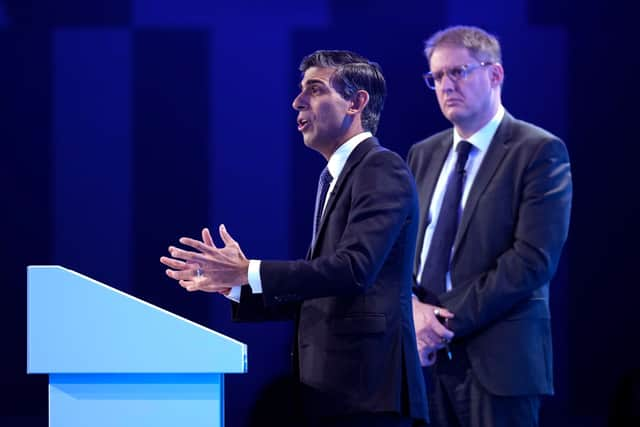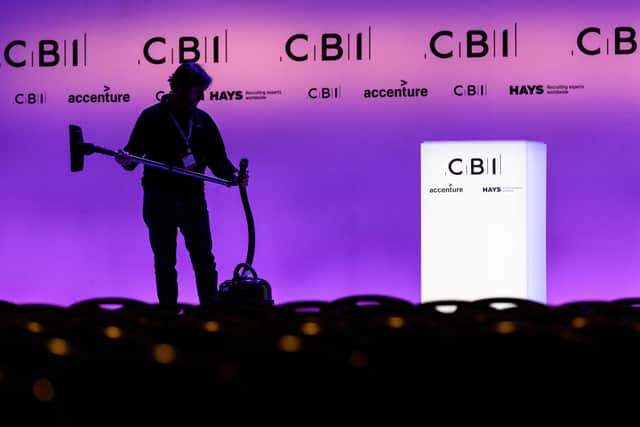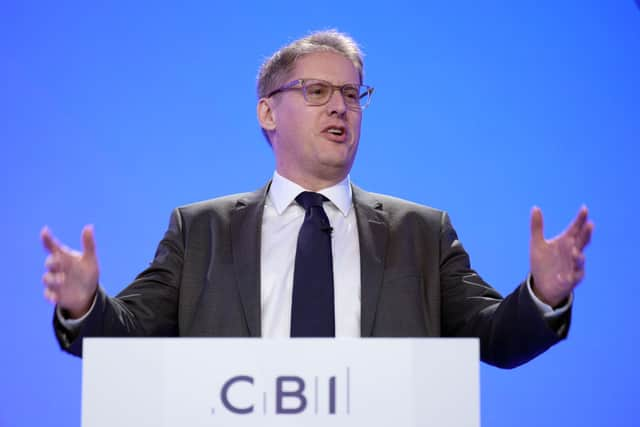What is the CBI? What allegations does it face, which members have quit, Tony Danker sacking explained
and live on Freeview channel 276
The Confederation of British Industry (CBI) has dismissed “a number of people” following a spate of sexual misconduct claims, including two alleged rapes.
In an open letter to the lobby group’s membership, CBI president Brian McBride said these employees had failed to meet the organisation’s “high standards of conduct”. He added that the CBI’s board and its senior leadership felt “a collective sense of shame” for having let down staff.
Advertisement
Hide AdAdvertisement
Hide AdAn independent investigation into the workplace culture at the CBI made several recommendations Mr McBride said the group would be implementing, including improved training and a whistleblowing hotline. Police are conducting their own investigation into the sexual misconduct claims.
Last week, the business trade body suspended all “policy and membership activity” until June after a second rape allegation was reported by the Guardian. In the immediate aftermath of the newspaper report, key members - including NatWest, John Lewis and BMW - announced they had cancelled their membership.
It came just days after the CBI sacked its boss Tony Danker following an investigation into claims he had made staff uncomfortable with his behaviour - although it has been made clear he has not been accused of rape or sexual misconduct.
For almost 60 years, the CBI had been one of the most influential lobby groups in the UK. It has often had the ear of Prime Ministers and Chancellors alike, allowing it to influence key business- and economic-related policies. Indeed, the group’s fingerprints were seen all over Jeremy Hunt’s recent Spring Budget 2023, with the Chancellor of the Exchequer’s focus on childcare reform echoing the CBI’s prior calls for an overhaul of the system.
Advertisement
Hide AdAdvertisement
Hide AdSo what exactly is the CBI - and what are the allegations it faces?
What is the CBI?
The Confederation of British Industry is a trade body that represents around 190,000 UK businesses. To give an idea of its sheer scale, the group’s members employ almost seven million people - roughly a third of all the workers employed by the private sector.
Founded in 1965, the CBI’s main aim is to promote the interests of British businesses, both in the UK and overseas. It has offices in key target markets for UK firms, such as Brussels, Washington DC, Beijing and New Delhi.


Given the group’s size, it wields a lot of political influence. Its annual conference is usually attended by the Prime Minister and the Leader of the Opposition as they aim to woo business leaders to their way of thinking.
Advertisement
Hide AdAdvertisement
Hide AdWhenever a Budget event comes around, the CBI’s policy requests often make it into the Chancellor’s speech. After fiscal events, Westminster also awaits its verdict with anticipation. The group’s influence is often centred on its boss - the director general of the CBI. Between the end of 2020 and March 2023, this position was held by Tony Danker.
What allegations does the CBI face?
The CBI has been hit by three waves of allegations in 2023. These relate to the conduct of its now-former boss Tony Danker, rape, as well as several sexual assault- and drug-related allegations against senior figures at the group, and another rape allegation a woman has made against two male colleagues at the CBI. Tony Danker is not one the men being accused of rape, sexual assault or drug-taking, and we cover the misconduct claim behind his sacking further down in this article.
On 3 April, the Guardian reported that more than a dozen women had claimed that they had been victims of sexual misconduct. One of the alleged victims claimed she had been raped at a staff party in a boat on the River Thames in London.
The other allegations reported by the newspaper included: attempted sexual assault, a senior manager sending explicit images to junior female workers over a period of several years, and inappropriate touching. It was also claimed that the organisation has a “widespread” cocaine problem. These claims are being investigated by City of London Police.
Advertisement
Hide AdAdvertisement
Hide AdFurther bad news for the CBI came on 5 April, the government suspended its ties with the organisation pending the outcome of the investigation into the allegations. Should this suspension become permanent, the CBI could lose the high levels of access it enjoys in Whitehall.
On 21 April, a new allegation of rape by a female CBI worker was reported by the Guardian. She told the newspaper she was working at one of the group’s overseas offices, when, having fallen unconscious after a night of heavy drinking, she was raped by two male colleagues. She claimed there was a lack of support from the CBI and criticised its workplace culture.


Meanwhile, the newspaper also reported another woman based at its London office was stalked by a male colleague in 2018. It is alleged that while the CBI upheld a finding of harassment, it discouraged the woman from reporting the stalking to police and the alleged stalker kept his job with the organisation.
The latest allegations led several key members to immediately quit the CBI. These included: Unilever, John Lewis, NatWest, BMW and Virgin Media 02. With its membership dwindling, the CBI announced it would be suspending almost all of its activities until June, when it will conduct an extraordinary general meeting.
What has the CBI said?
Advertisement
Hide AdAdvertisement
Hide AdOn 11 April, the CBI suspended three employees pending the results of an independent investigation. The group said it wass “liaising“ with the authorities and added that it would “cooperate fully” with any criminal investigations.
In a statement released by its board, the CBI apologised to the victims of its “organisational failure” and said the allegations about its workplace culture had been “devastating”.


After the latest rape claim came to light on Friday (21 April), the CBI released another statement, which read: “The latest allegations put to us by The Guardian are abhorrent and our hearts go out to any women who have been victims of the behaviour described. While the CBI was not previously aware of the most serious allegations, it is vital that they are thoroughly investigated now and we are liaising closely with the police to help ensure any perpetrators are brought to justice.
“We recognise the substance of the harassment report outlined as relating to an allegation made and investigated in January 2018. The finding of harassment was upheld and a sanction was imposed. However, the CBI does not recognise many of the most serious elements of the Guardian story relating to harassment, including the assertion that the individual had told the CBI of feelings of a sexual and violent nature towards the victim; and that he had followed her home. Neither is the CBI aware and our records do not support the report that the CBI discouraged her from referring the matter to the police.”
Advertisement
Hide AdAdvertisement
Hide AdThen, on Monday (24 April) it reported that it would be fully implementing the recommendations of an independent report into its workplace culture by employment law specialists Fox Williams, including the recruitment of a ‘chief people officer’ to ensure higher standards of workplace culture would be “deeply embedded” within the CBI. It added that it would be implementing a “zero-tolerance approach to sexual harassment and bullying behaviour”.


In an accompanying open letter to its membership, CBI president Brian McBride said the board and senior leadership of the group felt a “collective sense of shame” for letting down its staff. He wrote: “We now know that we were complacent. And we made mistakes in how we organised the business that led to terrible consequences.
“Our systems of culture management, harm prevention and eradication were insufficient. Individually, some - though not all - of these organisational deficiencies may even seem small. But, together, they compounded to cause great harm to some of our own people, and then to the CBI as a whole. We didn’t put in place sufficient preventative measures to protect our people from those seeking to cause harm and we didn’t react properly when issues arose as a result.
“We failed to filter out culturally toxic people during the hiring process. We failed to conduct proper cultural onboarding of staff. Some of our managers were promoted too quickly without the necessary prior and ongoing training to protect our cultural values, and to properly react when those values were violated. In assessing performance, we paid more attention to competence than to behaviour. Our HR function was not represented at board level, which reduced escalation paths to senior levels of the company when these were most needed. And we tried to find resolution in sexual harassment cases when we should have removed those offenders from our business.”
Advertisement
Hide AdAdvertisement
Hide AdHe added that the CBI was implementing changes “at pace” ahead of its extraordinary general meeting in June - an event that is likely to determine whether or not the group has a future.
What did Tony Danker do?
Tony Danker was sacked as director general of the CBI by the organisation’s board on 11 April following an investigation into separate misconduct allegations to those made above. He had been in post since taking over over from Carolyn Fairbairn in December 2020.
Born in Belfast, he held several influential business roles before becoming the boss of the organisation. After a 10-year stint at management consultancy McKinsey between 1998 and 2008, he worked for Gordon Brown’s government where he was a special advisor to the Treasury. Following Labour’s defeat in the 2010 General Election, he joined Guardian News and Media as an international director. He went on to become its chief strategy officer.


Having left the media group in 2017, he became the CEO of Be the Business - a body part-funded by the government which advises businesses on how to boost their productivity. From this role, he was appointed as head of the CBI in 2020.
Advertisement
Hide AdAdvertisement
Hide AdIn March 2023, just weeks before the Spring Budget, Mr Danker was forced to step aside as director general so an independent investigation could be carried out into his workplace conduct. The Guardian reported it was prompted by an allegation of sexual harassment against him that was made by a female CBI employee - although the CBI has not confirmed the nature of the allegations against its now former director general.
On 11 April, the CBI announced Mr Danker had been “dismissed with immediate effect” as the board of the lobby group had “determined that his own conduct fell short of that expected”. He has been replaced by the CBI’s former chief economist Rain Newton-Smith.
In an interview with the BBC after his sacking, Tony Danker apologised for making people feel "very uncomfortable". But he insisted he “never used sexually suggestive language” and “never had any physical contact” with people at the CBI.
Comment Guidelines
National World encourages reader discussion on our stories. User feedback, insights and back-and-forth exchanges add a rich layer of context to reporting. Please review our Community Guidelines before commenting.
